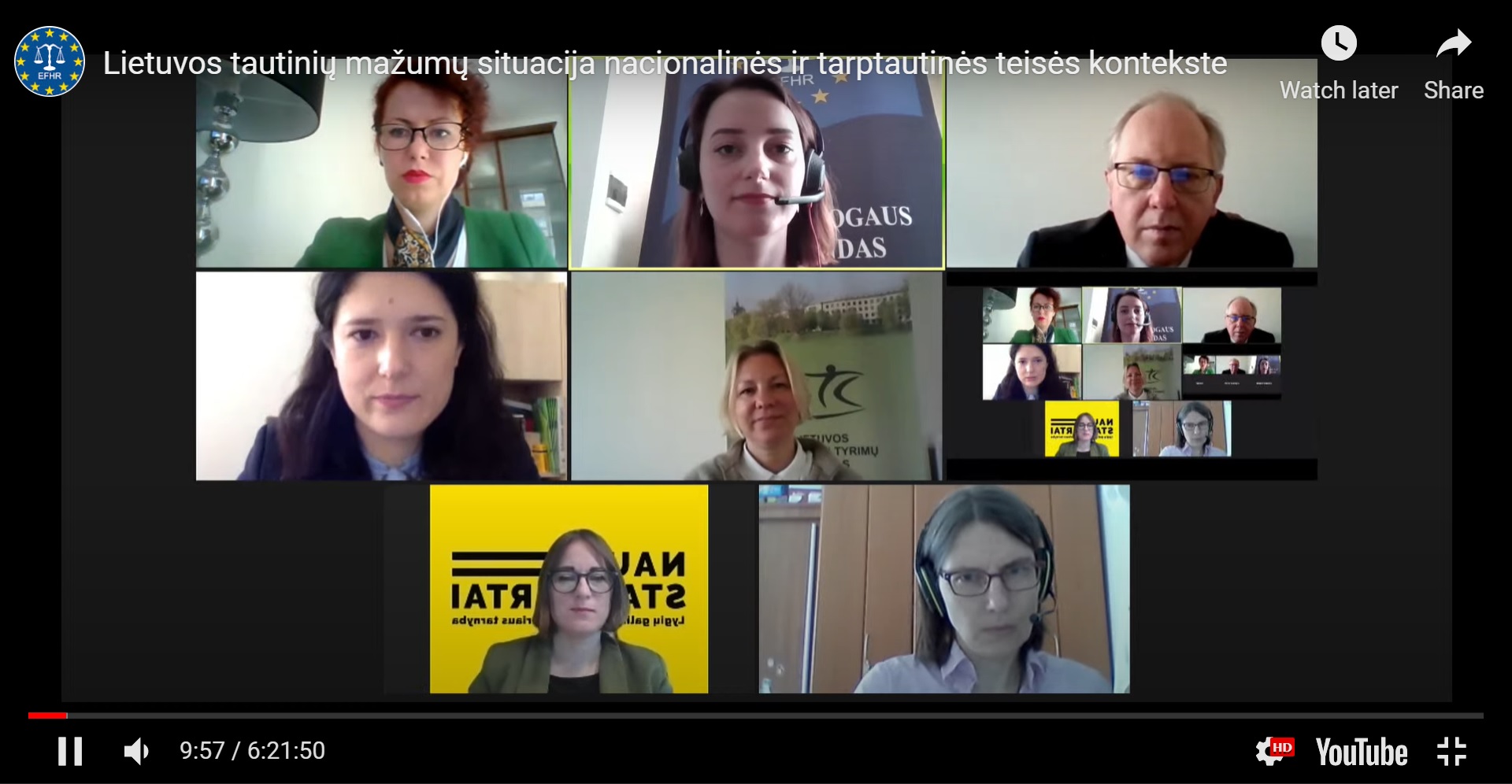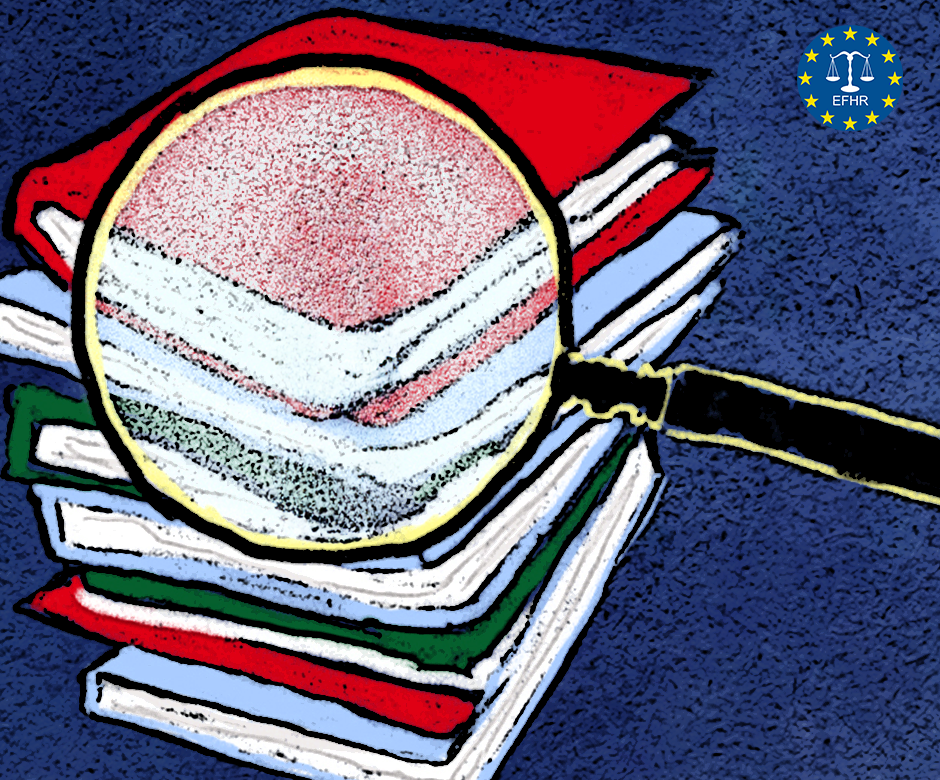- 2021/05/26
Minority rights, discrimination and a vision for the future at EFHR conference

Does the society know and accept national minorities? Would Lithuanians like to live and work with Poles, Russians and Romas? Is harassment based on nationality possible and how to recognize it? How the Council of Europe, OSCE, UN and other institutions guarantee the rights of national minorities? We were looking for answers to these questions during the conference “Situation of national minorities in Lithuania in the context of national and international law”, organized by the EFHR on the occasion of its 10th anniversary.
On the occasion of its anniversary, the organization received congratulations from Artūras Liudkovskis, Advisor to the Prime Minister of the Republic of Lithuania for National Minorities and Irmina Szmalec, Head of Consular section of the Polish Embassy in Vilnius, who emphasized the enormous contribution of the EFHR in strengthening the rights of national minorities, education of the society and inter-institutional and international cooperation.
The conference included presentations by well-known Lithuanian and foreign experts.
Vaiva Vėželytė-Pokladova from the Department of National Minorities under the Government of the Republic of Lithuania told about Lithuanian policy towards national minorities. She also presented the Program of Culture and Creativity Development, which is being developed in order to support full integration of national communities. The situation of national minorities in Lithuania was presented by Dr. Monika Frejutė-Rakauskienė from the Lithuanian Centre for Social Sciences, whose presentation included the results of public opinion polls and the issue of national minorities’ participation in the labour market.
Dr. habil. Elżbieta Kuzborska-Pacha, Advisor to the OSCE High Commissioner for National Minorities, presented the OSCE Guidelines, which provide for guaranteeing the rights of national minorities and strengthening their position in society.
Birutė Sabatauskaitė, Equal Opportunities Ombudsperson of the Republic of Lithuania, spoke about manifestations of discrimination based on ethnicity, stating that in 2020 alone the office received 85 complaints of discrimination based on race/ethnicity/nationality/language/tribe/ethnicity/citizenship. Unfortunately, this number does not reflect the actual situation, as often people who experience discrimination do not know how to recognize it or are afraid to file a complaint.
Dr. Łukasz Wardyn (EFHR expert), an expert in European and international law, presented the evolution of legal matters concerning the spelling of non-Lithuanian names and surnames in the Republic of Lithuania. His presentation included specific cases that changed the previous legal practices and helped more citizens to get the right to the original spelling of their names and surnames.
Prof. Artur Nowak-Far from the Warsaw School of Economics, talking about language rights in the EU, noted that in countries where national minorities can use their native language, members of these communities are more active and thus their integration into society is more effective.
The use of language rights in practice was also mentioned by Danuta Szejnicka from the National Agency for Education, which, among others, develops a program of education in the native language for schools of national minorities. She pointed out that in organizing education for national minorities great importance is attached to values – by deepening civic and cultural awareness, the aim is to make young people “ambassadors” not only of their own culture in Lithuania, but also of Lithuanian cultural heritage in their own communities and abroad, in their ethnic countries.
Dr. Ljubica Djordjevic from the European Centre for Minority Issues, talking about minority representatives in politics, noted that it is necessary to assess whether the delegates really represent the rights of all national minorities and whether they meet their needs and expectations.
Dr. Hanna Vasilevich from the International Centre for Ethnic and Linguistic Diversity gave examples from the Czech Republic regarding the implementation of minority rights. It is worth noting that in last year’s census, the Czech Republic paid much more attention to collecting data on national minorities than Lithuania, which is conducting the census this year. All Czech citizens had to state their nationality in the census – those who did not fill in the data online, received a paper document for data collection, which incidentally had as many as 7 language versions. It should be noted that in the Lithuanian census only 60,000 residents provided their nationality in the online questionnaire, and only 40,000 residents who did not complete the online questionnaire received additional paper versions of the questionnaire. Moreover, the questionnaire was only available in the official Lithuanian language. After comments from NGOs, translations of the questionnaire into English, Polish and Russian were made available, but residents were still only able to fill out the Lithuanian version of the questionnaire (the translations were only meant to be an additional aid).
Dr. Fernand de Varennes (UN Special Rapporteur on Minority Issues) pointed out that there is a fundamental difference in the perception of minorities between Europe and the UN. The expert pointed out that Europe tends to distinguish only between national minorities, while the UN has a broader view of minorities and distinguishes between national, ethnic, linguistic and religious minorities, which are treated differently in different contexts.
Dr. Agnieszka Szklanna, expert of the Council of Europe, Secretary to the Committee on Legal Affairs and Human Rights, drew attention to situations and complaints about the rights of national minorities that are addressed to the Council of Europe and its subordinate institutions.
The partners of the event: the Embassy of the Republic of Poland in Vilnius and the Department of National Minorities under the Government of the Republic of Lithuania.
Information partners: LRT.lt portal; “Znad Willi” radio station, zw.lt portal, TVP Vilnius, Wilnoteka.



